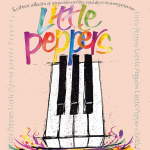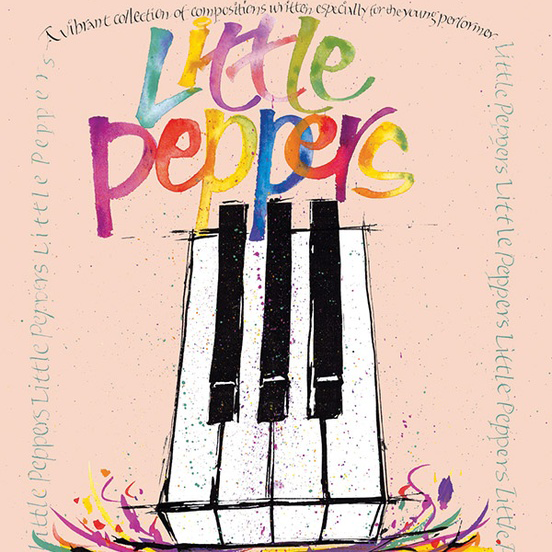
Little Peppers, by Elissa Milne – Digital Download Hard Copy
Shenanigans – Digital Download
Convertible – Digital Download
Lost – Digital Download
Found – Digital Download
Deadline – Digital Download
Twilight – Digital Download
Join me as I dive into Little Peppers — a lively and imaginative collection by Australian composer Elissa Milne. I’m playing six short pieces from the collection that may be written for early intermediate students, but are full of rhythmic sophistication, contrasting moods, and vivid character. From jazzy mischief in Shenanigans to the emotional contrasts of Lost and Found, and finally the drive of Deadline leading to the calm of Twilight, each piece shows how much expressive storytelling can fit into a single page of music.
Discover why these “small pieces with big personality” have become favorites among teachers who want their students to sound musical right from the start.
— Transcript —
The Australian composer, Elissa Milne, has a wonderful series of books, known as the Little Peppers series, Little Peppers. The pieces are short and colorful, not at all lacking in flavor. Some kind of sweet, some kind of fiery.
We’ll experience a little bit of both today as I look at the original book in the collection that started it all. Modern harmonies, jazz rhythms, and a little bit of gentle reflection. It’s music for students at an early intermediate level.
Little Peppers coming up next on the Piano Pedagogy Playlist.
Greetings to all you wonderful piano enthusiasts out there. I hope your day is going well. My name is Luke Bartolomeo. I’m a pianist, a teacher, and I also create apps for use in music education, including Flashnote Derby. Each Monday here on the Piano Pedagogy Playlist, I share with you some of my current favorites from the contemporary repertoire of music written for piano students. Music that inspires creativity, nurtures technique, and keeps lessons fresh.
The pieces from Elissa Milne’s collection, Little Peppers, are all very brief, one or two pages at the most. So I have time to share six of the 13 pieces in the book, and I put them into three groupings of two pieces each that I think complement each other nicely. Our first pairing puts on display Ms. Milne’s Comfort and Fluency Composing in a Jazz Idiom.
First comes a piece called Shenanigans, with a character that is playful and only slightly mischievous, as the title suggests. Here the syncopations and swing rhythms are natural, and will be instinctively understood by most students.
Then comes a piece called Convertible, which shifts gears into something that really grooves.Think top-down, sun-out, cruising tempo. First, I’ll play for you Shenanigans followed by Convertible.
The end of that last piece, Convertible, it’s actually kind of tricky. The harmony keeps alternating between C dominant seven and D flat dominant seven. The accidentals are constantly shifting, and the feel under your fingers of the black and white keys making up the parallel thirds is different with each repetition of the pattern.
Those last eight measures or so will require some special attention. The next two pieces I’ve put together make a really nice emotional diptych, Lost and Found. Lost begins with a sense of longing. There’s descending chromatic harmonies that give us a feeling of emptiness or searching. Milne manages to convey so much with just a few notes.
After that comes Found.It’s bright and rhythmic, almost giddy. You can picture the searcher doing a little dance of joy when the object they’ve been looking for is finally found.
Teaching these two pieces as a pair allows development of not just contrasting dynamics and tempos, but emotional contrast as well.
I really love how those two pieces complement each other. For a teacher, they’re a wonderful way to open a conversation with a student about musical storytelling. The ideas of having lost something and how we feel when that object is found, those would be familiar to even our youngest students.
Attaching the music to specific relatable emotions and situations can be a way of getting a student to open up and allow themselves to express the music more deeply.
Our final set brings yet another contrast. The two pieces are titled Deadline and Twilight.Now, Deadline captures the frantic rush of trying to get everything done and not quite having enough time to do it. The relentless staccato eighth notes and seven eight time signature capture that sense of pressure.
And I don’t think this piece is necessarily celebrating the hectic pace that many of us experience in our day-to-day lives. I tend to see it as a helpful reminder, maybe helping students to recognize when their emotions are spiraling a little bit, and that maybe what is needed is a step back and a deep breath.
And for us, that deep breath comes in the form of the second piece, called Twilight. It’s time to stop working or studying, and the world slows down.
But there’s an abundance of minor sixths in this piece, and it causes the mood to not sound completely settled, as if we’re using this time to decompress and emotionally unpack everything that went on during the day. We’re not there yet, but it’s getting us to a place of calm that doesn’t arrive until the final notes.
Am I reading too much into these pieces? Maybe. Would the composer agree with my commentary on her pieces?I really don’t know. But for me, I always try to find a personal, emotional connection with the music. And I try to help my students do the same, even if their connection with a piece is considerably different from mine.
Sometimes that connection is easy to put into words, and other times it’s best to just let the music do the talking.
And with that being said, we have to close the lid on today’s episode of the Piano Pedagogy Playlist. I’ve played six pieces from Little Peppers by Australian composer Elissa Milne, a collection that proves small pieces can make a big impression.
If you enjoyed today’s selections, you’ll definitely want to check out her other books in the Peppers series, including Easy Little Peppers, More Little Peppers, and Pepperbox Jazz. We’ll check out some of these together in a future episode. You’ll find links in the description or at my website, pianopedagogyplaylist.com.
As you head into your week, maybe take a cue from these Little Peppers. Keep things light, colourful, full of personality. Sometimes it’s the smallest pieces that bring the biggest smiles.
I’ll look forward to seeing you again next Monday, when I’ll play some more of my current favourites from the contemporary piano teacher’s repertoire. Until then, keep nurturing the music, and have a great week.




Leave a Reply